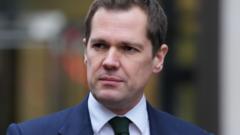Did the BBC Overstep by Apologizing for Jenrick's Xenophobia Accusation?

The BBC's Apology: A Deep Dive into the Controversy Surrounding Xenophobia and Immigration Discourse
The recent controversy surrounding the BBC’s Radio 4 Today programme illustrates the tense intersection of immigration discourse, public sentiment, and media responsibility. When Dr. Krish Kandiah, a theologian and contributor to the show's Thought for the Day segment, accused shadow justice secretary Robert Jenrick of xenophobia, it sparked a significant backlash, prompting the BBC to issue an apology. This incident not only highlights the complexities of immigration discussions in the UK but also raises questions about the role of media in shaping public perceptions. In this article, we will explore the details surrounding the incident, its implications, and the broader societal context of immigration and xenophobia in the UK.
Understanding the Context of the Controversy
The incident began when Dr. Kandiah quoted a controversial statement made by Robert Jenrick, where he expressed his reluctance for his daughters to live near "men from backward countries who broke into Britain illegally." This statement was made in an article published in the Mail on Sunday and was met with widespread criticism for its inflammatory language. Dr. Kandiah's response was to label Jenrick's comments as xenophobic, stating that such rhetoric reflects an irrational fear of the unknown, which can lead to societal divisions and unrest.
The Role of Media and Ethics in Reporting
The BBC's Thought for the Day segment, aimed at providing a faith-based perspective on current issues, is overseen by the BBC’s religion department. While the segment is intended to foster thoughtful discourse, the inclusion of incendiary language raised questions about editorial judgment. The BBC's subsequent apology underscored the need for sensitivity in addressing topics that can evoke strong emotional responses, particularly regarding immigration and national identity.
Xenophobia: A Defining Feature of Modern Immigration Discourse
Xenophobia, defined as an irrational fear or dislike of people from other countries, has increasingly become a prevalent theme in discussions surrounding immigration. Dr. Kandiah pointed out that fear often stems from misinformation and a lack of understanding about migrants and asylum seekers. This fear has been exacerbated by political rhetoric that portrays migrants as threats to social cohesion and national security.
Public Reaction and Political Responses
In response to Dr. Kandiah's remarks, Robert Jenrick defended his comments by asserting that concern for the safety of children should not be equated with racism. He emphasized that being cautious about immigration does not inherently reflect xenophobic attitudes. This assertion reflects a broader narrative often used by politicians to justify stringent immigration policies while attempting to distance themselves from accusations of racism.
The Impact of Language on Public Perception
The language used in political discourse significantly influences public perception. Jenrick's characterization of migrants as "men from backward countries" is an example of how language can perpetuate stereotypes and foster xenophobia. Such statements not only alienate communities but can also incite hostility towards individuals seeking refuge or a better life. The BBC's apology highlights the media's responsibility to challenge harmful narratives rather than amplify them.
Migrants in the UK: A Statistical Overview
In 2024, the UK is expected to see approximately 948,000 people arriving who plan to stay for at least a year, contrasting with an estimated 517,000 who will leave. While the figures surrounding small boat crossings in the English Channel often dominate headlines, they represent only a small fraction of the overall immigration landscape. Understanding this context is crucial for fostering informed discussions about immigration policy and its implications for society.
Fostering Understanding: Addressing Xenophobia and Fear
In light of the recent events, it is essential to address the root causes of xenophobia. Misinformation, lack of education, and the portrayal of migrants in negative contexts contribute to societal fears. Initiatives aimed at promoting cultural understanding, such as community outreach programs and educational campaigns, can help mitigate these fears. By fostering empathy and dialogue, society can work toward more inclusive attitudes regarding immigration.
The Role of Political Discourse in Shaping Public Attitudes
Political leaders play a pivotal role in shaping public attitudes towards immigration. The rhetoric they employ can either exacerbate fears or promote understanding. As seen in this controversy, statements that reduce complex human experiences to simplistic terms can lead to widespread misunderstanding and division. Politicians must recognize their responsibility to foster a more nuanced dialogue about immigration and its implications.
Conclusion: Navigating the Complex Landscape of Immigration and Xenophobia
The controversy surrounding Dr. Kandiah's comments and the BBC's subsequent apology underscores the urgent need for a more thoughtful and empathetic approach to immigration discourse. As society grapples with the challenges and opportunities presented by migration, it is crucial to recognize the human stories behind the statistics and to challenge xenophobic narratives that perpetuate division. The media, political leaders, and communities must work together to foster understanding and compassion in an increasingly diverse world.
FAQs
What is xenophobia?
Xenophobia is defined as an irrational fear or aversion to people from other countries or cultures. It often manifests in negative stereotypes and discrimination against immigrants.
How does political rhetoric influence public perception of immigration?
Political rhetoric can significantly shape public attitudes by framing immigrants as either threats or valuable contributors to society. Negative portrayals can lead to increased fear and hostility, while positive narratives can foster understanding and acceptance.
What steps can be taken to combat xenophobia in society?
Combating xenophobia involves promoting education, cultural understanding, and community outreach programs that foster dialogue. It is essential to challenge harmful stereotypes and create spaces for positive interactions between diverse groups.
As we reflect on these complex issues, how can we as individuals contribute to a more inclusive society? #Xenophobia #Immigration #BBCControversy
Published: 2025-08-13 17:42:06 | Category: technology



